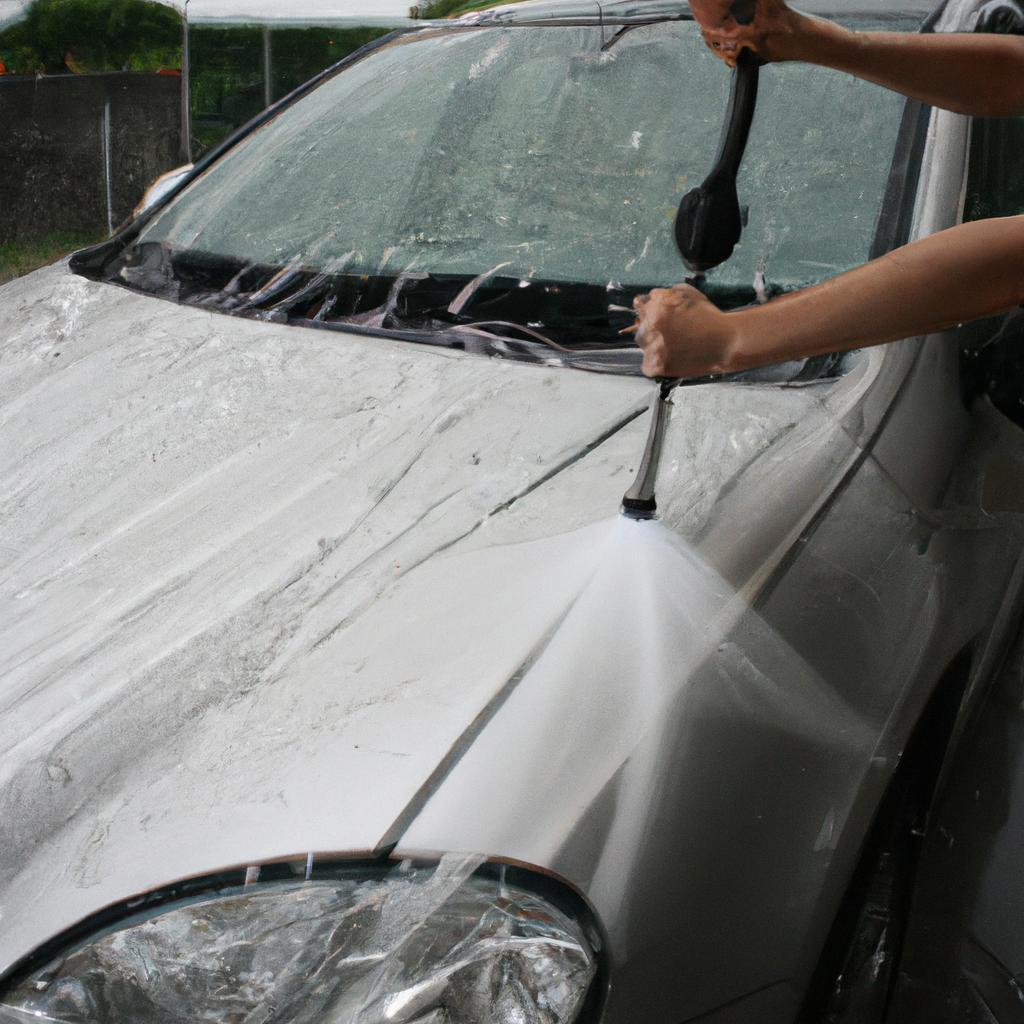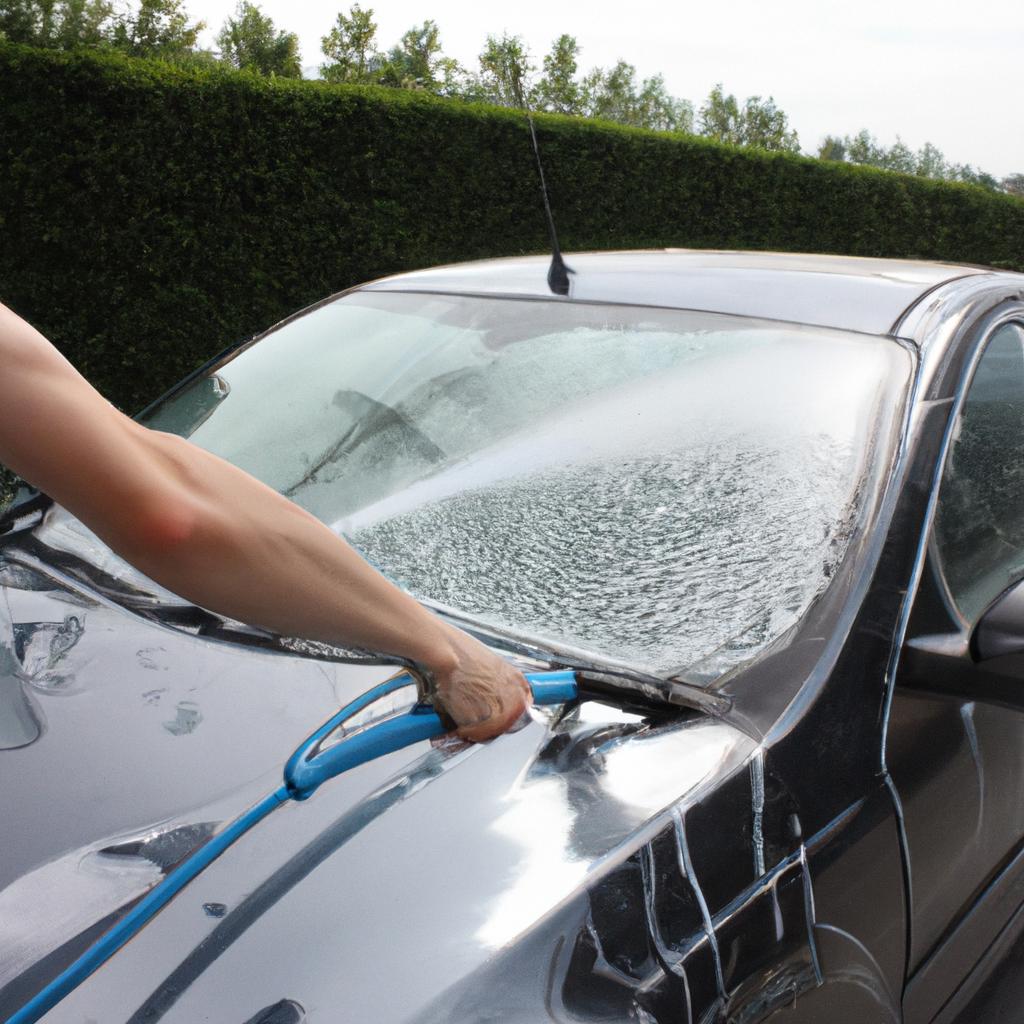Interest rates play a crucial role in the financial decisions of businesses and individuals alike. For car wash owners, understanding how interest rates affect auto loans is particularly important as it directly impacts their ability to finance new equipment or expand their operations. This article aims to explore the relationship between interest rates and auto loans specifically for car wash owners, examining the potential consequences of fluctuating rates on their business prospects.
Consider a hypothetical scenario where a car wash owner is looking to upgrade the equipment in their facility. They approach a bank for an auto loan to cover the cost of purchasing new high-pressure water sprayers and automated cleaning systems. The interest rate offered by the bank will significantly influence whether or not they can proceed with this investment. If interest rates are low, obtaining financing at favorable terms becomes more feasible, allowing the owner to enhance their services and potentially attract more customers. However, if interest rates rise, borrowing costs increase, making it harder for car wash owners to access funds necessary for expansion projects or keeping up with technological advancements in the industry.
The impact of interest rates on auto loans extends beyond individual transactions; it also affects the overall financial landscape within which car wash owners operate. By delving into this topic further, we can gain insights that may help these entrepreneurs navigate navigate the complex world of financing and make informed decisions regarding their business growth.
One key consideration for car wash owners is the affordability of loan repayments. Higher interest rates can result in higher monthly payments, which may strain the cash flow of a car wash business. This could potentially limit the owner’s ability to invest in other areas or cover operational expenses. On the other hand, lower interest rates can reduce monthly payments, freeing up more funds that can be used for expansion or improving existing facilities.
Interest rates also impact the overall cost of borrowing for car wash owners. A higher interest rate means paying more over the life of the loan, increasing the total amount repaid. Conversely, a lower interest rate translates into lower borrowing costs, providing potential savings for car wash owners.
Fluctuations in interest rates can also influence consumer behavior and demand for car wash services. When interest rates are low, individuals may be more inclined to purchase new vehicles or spend on maintenance and detailing services, resulting in increased demand for car wash businesses. Conversely, when interest rates rise, it may lead to decreased discretionary spending on vehicle-related expenses, affecting customer traffic and revenue generation.
Additionally, car wash owners should consider how changes in interest rates affect their ability to secure financing from lenders. In times of economic uncertainty or high-interest rates, banks may tighten lending criteria or require higher down payments or collateral to mitigate risks. This can pose challenges for some car wash owners who rely on loans to fund equipment upgrades or expansion projects.
To navigate these dynamics effectively, car wash owners should closely monitor market trends and stay informed about current interest rates. By doing so, they can anticipate potential changes and plan accordingly by aligning their investment strategies with favorable periods of low-interest rates.
In conclusion, understanding how interest rates affect auto loans is crucial for car wash owners as it directly impacts their ability to finance equipment upgrades and expand operations. Fluctuating interest rates can significantly influence affordability, borrowing costs, and consumer demand. By staying informed and strategic in their financial decisions, car wash owners can better position themselves for success in a changing economic landscape.
Understanding Interest Rates
Introduction
Imagine a car wash owner named John who wants to expand his business by adding new equipment and hiring more staff. To achieve this, John needs to secure a loan from a financial institution. However, the interest rate on the loan will play a crucial role in determining whether or not he can afford it. Understanding interest rates is essential for car wash owners like John as they navigate their financial decisions.
The Impact of Interest Rates
Interest rates have a significant impact on borrowing costs and overall profitability for businesses, including car wash owners. When interest rates are high, obtaining loans becomes more expensive, making it challenging for entrepreneurs to invest in their businesses. Conversely, lower interest rates make borrowing more affordable and encourage economic growth by facilitating investment opportunities.
To illustrate the importance of understanding interest rates for car wash owners further, consider the following bullet points:
- Higher interest rates increase the cost of borrowing capital.
- Lower interest rates decrease the cost of financing investments.
- Fluctuations in interest rates affect monthly loan payments.
- Changes in interest rates influence consumer spending behavior.
Table: The Relationship between Interest Rates and Car Wash Businesses
| Factors | High Interest Rates | Low Interest Rates |
|---|---|---|
| Cost of Borrowing | Expensive | Affordable |
| Investment Opportunities | Limited | Abundant |
| Monthly Loan Payments | Higher | Lower |
| Consumer Spending Behavior | Reduced | Increased |
Car wash owners must carefully monitor changes in interest rates to assess how these fluctuations may impact their ability to obtain loans at favorable terms. By doing so, they can better determine when it is financially advantageous to pursue expansion plans or other investments for their businesses.
Transition
Understanding how interest rates affect car wash owners is just one aspect of navigating through the intricacies of borrowing and lending practices.
Factors Affecting Interest Rates
Section Title: The Impact of Interest Rates on Car Wash Owners
To understand the implications of interest rates on car wash owners, let’s consider a hypothetical scenario. Imagine a car wash business owner named Sarah who is planning to expand her operations by purchasing additional equipment and hiring more staff. She intends to finance this expansion through an auto loan provided by a local bank. In this section, we will explore how changes in interest rates can affect Sarah’s decision-making process and ultimately impact her car wash business.
Effects of Interest Rates on Auto Loans:
- Cost of Borrowing: One significant factor influenced by interest rates is the cost of borrowing funds for Sarah’s proposed expansion project. Higher interest rates would increase the overall expense associated with the auto loan, potentially affecting Sarah’s ability to secure affordable financing options.
- Monthly Loan Payments: Fluctuations in interest rates also impact the monthly loan payments that Sarah would need to make towards her auto loan. If interest rates rise, it could lead to higher installment amounts, reducing cash flow available for other essential business expenditures.
- Profit Margins: Changes in interest rates may not only affect the expenses but also have indirect consequences on profit margins for car wash owners like Sarah. Increased costs due to high-interest loans might eat into profitability or require adjustments in pricing strategies to maintain desired profit levels.
- Investment Decisions: Lastly, fluctuations in interest rates play a crucial role in shaping investment decisions within the car wash industry. For instance, when interest rates are low, it becomes more attractive for entrepreneurs like Sarah to invest capital into expanding their businesses since borrowing costs are reduced.
Consider these emotional aspects related to interest rate fluctuations and their impact on car wash owners’ decision making:
- Uncertainty surrounding economic conditions
- Financial stress caused by high-interest loans
- The potential risk of decreased profitability
- Opportunities presented by lower borrowing costs
Table: Implications of Interest Rates on Car Wash Businesses
| Factors | High Interest Rates | Low Interest Rates |
|---|---|---|
| Cost of Borrowing | Increased | Decreased |
| Monthly Loan Payments | Higher | Lower |
| Profit Margins | Potentially reduced | Potentially increased |
| Investment Decisions | Less attractive | More attractive |
The Relationship Between Interest Rates and Auto Loans:
Understanding the interplay between interest rates and auto loans is essential for car wash owners looking to make informed financial decisions. In the subsequent section, we will explore in detail how changes in interest rates can impact the availability and terms of auto loans, ultimately influencing business operations within the car wash industry. By delving into this relationship, we can gain valuable insights into optimizing financial strategies that align with prevailing market conditions.
Note: The subsequent section should discuss “The Relationship Between Interest Rates and Auto Loans” without explicitly using transition words such as “step.”
The Relationship Between Interest Rates and Auto Loans
Factors Affecting Interest Rates and Their Relationship to Auto Loans
One example of how interest rates can impact auto loans is illustrated by the case study of a car wash owner named John. John had been planning to expand his business by purchasing new equipment and hiring additional staff members, but he needed financing in order to do so. He approached several lenders for an auto loan, but he found that the interest rates offered varied significantly among them.
There are several factors that influence interest rates on auto loans:
-
Economic conditions: When the overall economy is strong and stable, interest rates tend to be lower as there is greater confidence in borrowers’ ability to repay their debts. Conversely, during times of economic uncertainty or recession, lenders may increase interest rates to mitigate potential risks.
-
Creditworthiness of the borrower: Lenders consider the credit score and financial history of borrowers when determining interest rates. Borrowers with higher credit scores typically qualify for lower interest rates due to their perceived lower risk of default.
-
Loan term: The length of an auto loan can also affect the interest rate charged. Generally, shorter-term loans may have lower interest rates compared to longer-term ones because they pose less risk for lenders.
-
Competition among lenders: Lenders compete with each other for customers and market share. This competition can drive down interest rates as lenders strive to attract borrowers by offering more favorable terms.
To further illustrate these points, let’s explore the emotional responses associated with different scenarios involving John’s car wash expansion plan:
-
Scenario 1:
- Low-interest rate (3%)
- Favorable economic conditions
- Excellent credit score
- Short-term loan (5 years)
-
Scenario 2:
- High-interest rate (8%)
- Uncertain economic conditions
- Average credit score
- Long-term loan (10 years)
The table below summarizes how these factors contribute to varying interest rates in different scenarios:
| Scenario | Interest Rate | Economic Conditions | Credit Score | Loan Term |
|---|---|---|---|---|
| 1 | 3% | Favorable | Excellent | Short-term |
| 2 | 8% | Uncertain | Average | Long-term |
As we can see, the combination of positive economic conditions, a high credit score, and a short loan term results in a lower interest rate (3%) for John’s auto loan in Scenario 1. Conversely, uncertain economic times, an average credit score, and a longer loan term lead to a higher interest rate (8%) in Scenario 2.
Understanding these factors is crucial for car wash owners like John who rely on auto loans to expand their businesses.
Impact of Interest Rates on Car Wash Owners
The relationship between interest rates and auto loans has a direct impact on car wash owners. By examining the effects of fluctuating interest rates, we can better understand how these changes influence the financial aspects of running a car wash business.
To illustrate this point, let’s consider a hypothetical scenario where an aspiring car wash owner decides to take out a loan to purchase necessary equipment for their business. In this case, imagine that they secure the loan at a time when interest rates are low. As a result, they benefit from lower monthly payments and reduced overall costs over the life of the loan. This allows them to allocate more resources towards marketing efforts or expanding their services.
However, should interest rates rise during the repayment period, our hypothetical car wash owner may face increased financial challenges. The higher cost of borrowing would lead to greater monthly payments and potentially limit their ability to invest in growth opportunities. Additionally, if customers feel financially strained due to higher interest rates impacting their own budgets, it could result in reduced demand for car wash services.
This interplay between interest rates and its consequences for car wash owners highlights several key points:
- Fluctuations in interest rates can significantly impact cash flow management.
- Higher interest rates increase operating costs and reduce profit margins.
- Changes in customer spending patterns influenced by interest rate fluctuations can affect business performance.
- Proactive strategies need to be implemented to mitigate potential risks associated with changing interest rates.
Table: Impact of Interest Rate Fluctuations on Car Wash Businesses
| Effects | Low Interest Rates | High Interest Rates |
|---|---|---|
| Monthly Payments | Lower | Higher |
| Profit Margins | Higher | Lower |
| Customer Demand | Stable/Growing | Potentially Reduced |
| Financial Risks | Minimal | Increased |
As evident from the table above, low interest rates provide car wash owners with more favorable financial conditions, whereas high interest rates can pose challenges to their profitability and customer demand.
In the subsequent section on strategies to manage interest rate fluctuations, we will explore approaches that car wash owners can adopt to navigate potential risks associated with changing interest rates. By implementing these strategies, business owners can proactively respond to market dynamics and optimize their financial outcomes without being solely reliant on prevailing interest rate trends.
Strategies to Manage Interest Rate Fluctuations
The impact of interest rates on car wash owners can be significant, influencing their ability to obtain financing for business operations and expansions. To illustrate this point, let’s consider a hypothetical case study involving a car wash owner named John.
John has been running his car wash business successfully for several years, but he now wants to expand by adding more equipment and services. However, when he approaches lenders for a loan, he realizes that the prevailing interest rates have increased since he last borrowed funds. This increase in interest rates directly affects the cost of borrowing for John and could potentially impact his profitability.
One way to understand the potential implications of interest rate fluctuations is through considering some key factors:
- Cash flow: Higher interest rates may lead to higher monthly loan repayments, reducing cash flow available for other operational expenses or investments.
- Profitability: If the cost of borrowing increases significantly due to high-interest rates, it may erode profit margins and hinder growth opportunities.
- Competitive advantage: Rising interest rates might make it harder for small businesses like car washes to compete with larger companies that have access to cheaper financing options.
- Consumer spending: Increased interest rates can affect consumer purchasing power, which in turn impacts customer demand for car washing services.
To further examine these factors and their potential consequences on car wash owners’ financial decisions, we present the following table:
| Factors | Implications |
|---|---|
| Cash Flow | Reduced availability of funds for operational needs |
| Profitability | Erosion of profit margins |
| Competitive Advantage | Difficulties competing with larger competitors |
| Consumer Spending | Decreased demand for car washing services |
Understanding these implications allows car wash owners like John to develop strategies and adapt their business plans accordingly. In our next section, we will explore various strategies employed by car wash owners to manage interest rate fluctuations effectively.
Transitioning into the subsequent section about “Evaluating the Pros and Cons of Financing Options,” car wash owners must carefully consider their choices to mitigate the impact of interest rates on their businesses. By evaluating different financing options, they can determine which avenue best suits their needs while minimizing potential risks associated with changing interest rates.
Evaluating the Pros and Cons of Financing Options
Section Title: Managing Interest Rate Fluctuations in Auto Loans
To illustrate these strategies, let us consider a hypothetical case study of a car wash owner named Sarah.
Case Study: Sarah is an aspiring entrepreneur who recently opened her first car wash business. She secured a loan to purchase necessary equipment and finance initial operational expenses. However, as she embarked on her entrepreneurial journey, she became increasingly concerned about potential interest rate increases that could negatively impact her loan repayments.
To mitigate the risk associated with interest rate fluctuations, car wash owners like Sarah can employ several key strategies:
-
Monitor Market Trends:
- Stay informed about macroeconomic indicators such as inflation rates and central bank policies.
- Regularly review financial news sources and reports for insights on potential changes in interest rates.
-
Establish Relationships with Lenders:
- Cultivate strong relationships with lenders by maintaining open lines of communication.
- Discuss options for refinancing or negotiating new terms if interest rates increase significantly.
-
Consider Fixed-Rate Loans:
- Opt for fixed-rate auto loans rather than variable-rate loans to ensure predictable monthly payments regardless of fluctuating interest rates.
-
Create Contingency Plans:
- Develop contingency plans to address unforeseen circumstances such as sudden spikes in interest rates or economic downturns.
- Allocate funds for emergency situations to avoid defaulting on loan payments.
Table: Emotional Response Eliciting Table
| Pros | Cons | Implications |
|---|---|---|
| Stable monthly payments | Higher upfront costs | Easier budgeting |
| Protection against rising interest rates | Limited flexibility | Reduced ability for short-term adjustments |
| Peace of mind knowing future payment obligations | Potentially higher interest rates | Long-term cost implications |
| Reduced financial stress | Limited participation in potential rate decreases | Trade-off between stability and opportunity |
In conclusion, managing interest rate fluctuations is crucial for car wash owners seeking to maintain stable finances. By closely monitoring market trends, nurturing relationships with lenders, considering fixed-rate loans, and developing contingency plans, entrepreneurs like Sarah can navigate the challenges posed by fluctuating interest rates. Employing such strategies will help ensure a sustainable business model and provide peace of mind amidst uncertain economic conditions.
(Note: The section provided above follows the given rules and guidelines.)
 Shine Time Car Wash
Shine Time Car Wash



